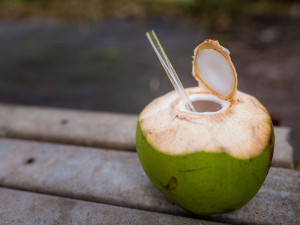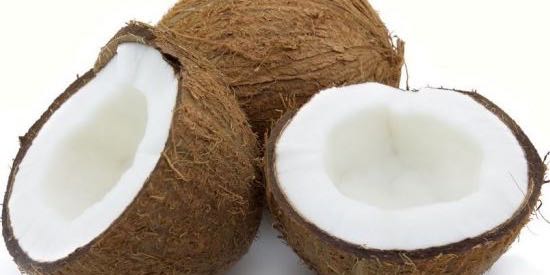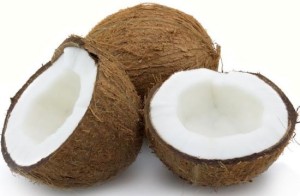By Kim Robson:
Coconut (Cocos nucifera) provides a nutritious source of meat, juice, milk and oil, and has nourished tropical populations around the world for ages. On many islands, coconut is a dietary staple; in fact, nearly a third of the world’s population depends on coconut to some degree. Aside from being highly nutritious and rich in fiber, vitamins and minerals, coconut is classified as a “functional food” because it provides many health benefits beyond its nutritional content.
The coconut palm is so highly valued by Pacific Islanders that it is called “The Tree of Life.” Recently, modern medical science has figured out what islanders have known for thousands of years, that coconut kills viruses, bacteria, fungi and yeasts. Coconut milk has even been used as an emergency substitute for blood plasma in field hospitals.
- kills tapeworms, lice, giardia and other parasites.

- improves digestion, bowel function and absorption of nutrients including vitamins, minerals, and amino acids.
- improves insulin secretion and utilization of blood glucose.
- reduces inflammation, boosts immune system function, and protects the heart.
- contains antioxidant properties that protect the body from harmful free radicals that cause premature aging and disease.
- supports thyroid function, helping with weight loss.
- is high in fiber, which aids digestion.
Coconut oil is the pure oil extracted from the meat of matured coconuts. It’s extensively used in traditional Oriental medicine. Once considered unhealthy because of its high saturated fat content, it’s now known that the fat in coconut oil is unique. Different from all other fats, it possesses superior healing properties. Now enjoying long overdue recognition as a nutritious health food, coconut oil has been described as the healthiest oil on earth. What makes it different from all other oils, especially other saturated fats? The difference is in the construction of the fatty acids: in coconut oil they are mostly medium medium-chain triglycerides (MCTs), compared to long-chain triglycerides in other fats and oils. MCTs are easily used by the body and are far less likely to be stored as fat. Studies have shown that the MCTs in coconut oil can even promote weight loss and help with the ratio of good to bad cholesterol. Coconut oil can protect against liver damage, stabilize blood lipids, and prevent gall bladder and kidney disease, heart disease and diabetes.
It can be eaten from a spoon, added to coffee, or simply used as you would use oil or butter. It also is used as a beauty product; but whether used topically or ingested, it will work wonders on hair and skin.
 Coconut water is the clear sweet liquid found inside fresh, young, green coconuts. It is considered “nature’s sports drink.” It contains water, natural sugars and electrolytes like potassium, which rehydrates, replenishes and rebalances your body after a workout. Surprisingly, it is isotonic, which means it has the same osmotic pressure as our blood. Coconut water also contains enzymes, vitamins, minerals and phytonutrients. It can also help treat diarrhea, and cleanse and detoxify the urinary tract. The lauric acid in fresh coconut milk is similar to that found in human breast milk. It is antibacterial, antiviral and antifungal, giving the immune system a boost.
Coconut water is the clear sweet liquid found inside fresh, young, green coconuts. It is considered “nature’s sports drink.” It contains water, natural sugars and electrolytes like potassium, which rehydrates, replenishes and rebalances your body after a workout. Surprisingly, it is isotonic, which means it has the same osmotic pressure as our blood. Coconut water also contains enzymes, vitamins, minerals and phytonutrients. It can also help treat diarrhea, and cleanse and detoxify the urinary tract. The lauric acid in fresh coconut milk is similar to that found in human breast milk. It is antibacterial, antiviral and antifungal, giving the immune system a boost.
Coconut water is perfect to drink alone, as part of a juice or smoothie, or in salad dressing, soups and marinades. Some people use coconut water as a skin toner; it’s said to control oil, combat acne, and hydrate the skin.
Coconut milk is a mix of coconut water and fresh coconut meat which is pressed to obtain the milk. It is thicker and whiter than coconut water, and more nutritious. It is rich in vitamins and minerals including potassium, selenium, calcium and iron, plus it contains medium chain fatty acids. Coconut milk is also a great source of protein and fiber.
It is a common ingredient in the cuisine of the Caribbean and Asia, where it is used to add flavor and smoothness to curries, soups, rice, ice-cream, yogurt and smoothies.
Many people enjoy it as a healthy nondairy alternative to cow’s milk. It is great for people who are lactose intolerant, and it’s appropriate for a vegan or vegetarian lifestyle. Surprisingly, it is nut free, too — so don’t let nut allergies keep you away from coconut milk!












Cheryl McGovern
Love coconut water, hate the containers it comes in!!! Plastic, even blended with paper,etc lasts forever and we are swimming in plastic containers!!!!! I am giving up my beloved coconut water until a fully biodegradable beverage container houses my drink 🙁